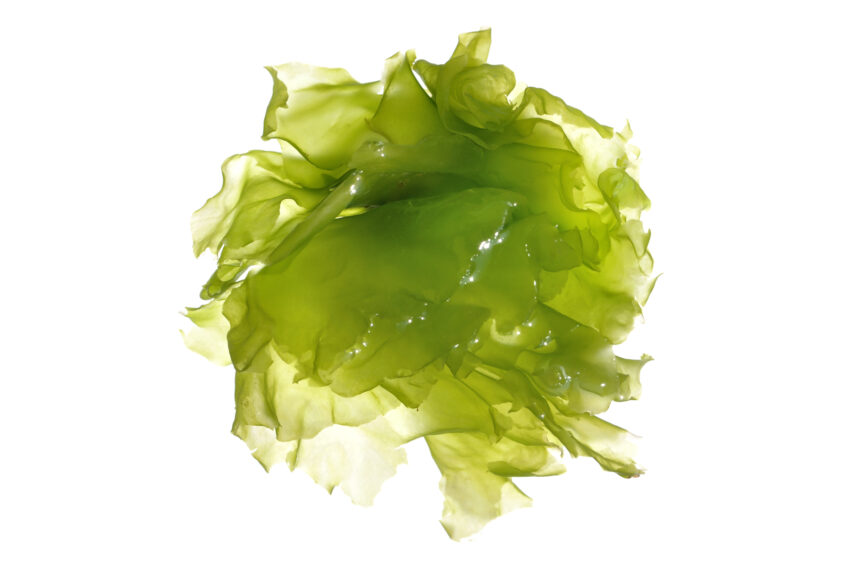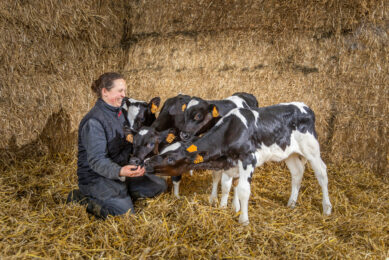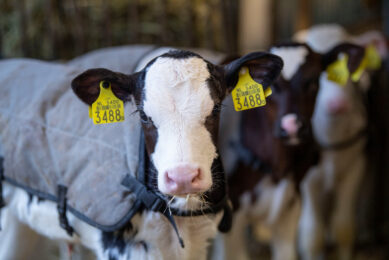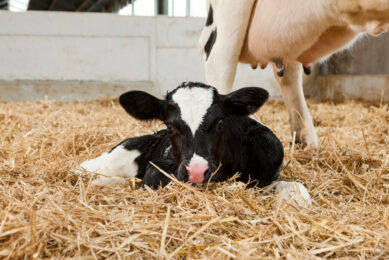The use of seaweed extract in cattle feed

Seaweed, whether they are green, red or brown, are an abundant, under-used resource in helping reducing the use of antibiotics. What are the benefits for dairy cows, and specifically for calves?
Macroalgae, or seaweeds are divided in three different groups: green, red and brown. They contain a variable part of carbohydrates (mainly polysaccharides), proteins, minerals, lipids and vitamins. The French company Olmix has dedicated research on these ingredient and focuses mainly on the extraction of seaweed polysaccharides, namely the MSP (Marine Sulfated Polysaccharides).
The specificity of Marine Sulfated Polysaccharides stands in the complexity of their structure. Indeed, MSP are branched hetero-polysaccharides, meaning that they are composed of various and rare sugar units. Moreover, these sugars extracted from seaweeds can be sulfated, conferring them a special reactivity. MSPs reactivity, hence their biological properties, varies a lot according to the type of sugars and linkage they contain, their level of sulfation and also their molecular weight. Therefore, several MSP with distinct biological activities can be found in algae.
Effect on digestive infections
Whether the origin is infectious or feed related, digestive disorders in calves are some of the most significant neonatal problems in dairy farming. Seaweed extracts, combined with other ingredients, can be an interesting alternative to control digestive troubles on calves. The surface of the gastrointestinal epithelium is covered with a protective mucus layer acting as a physical barrier between the subjacent tissue and pathogens. The mucus is mainly composed of mucins, glycoproteins produced by goblet cells, that give it its viscoelastic and gelling properties. Many studies have demonstrated the advantage of mucins for reducing the translocation of pathogens, such as Yersinia enterocolitica or Escherichia coli in calves. The possibility of stimulating mucin production by different sulphated polysaccharides has been demonstrated in 2000 by Barcelo et al. The results show that the tested ulvans significantly increase mucin production, on the contrary to the other tested seaweed extract. Also, the montmorillonite and spirulina in the are beneficial for the animals. Montmorillonite can limit dehydration in calves affected with digestive troubles. It has also shown its capacity to constitute an obstacle to micro-organisms such as Escherichia coli and Clostridium without comprising the digestibility of nutrients. Spirulina provides easily assimilated concentrated nutritional proteins (65% protein including 18 essential amino acids) to stimulate the calf’s vitality. In a product called Diet, Olmix associates ulvans extract*, spirulina and a micronised hydro-dispersible montmorillonite with remarkably fine granulometry.
Click here for more information on New Proteins
Seaweed to prevent ketosis
The treatment and prevention of ketosis involve correcting the energy balance and supporting liver functions. The precursors of carbohydrates (such as monopropylene glycol, MPG) are commonly used to provide rapidly assimilated energy. However, these solutions cannot support liver functions or detoxify the liver and kidneys. Recent scientific publications have shown that some MSPs have a direct impact on liver functioning. These MSPs have anti-hyperlipidemic properties which regulate the cycle of bile acids and the lipid metabolism. The capacity of algal polysaccharides to improve liver metabolism was first evidenced by Pengzhan et al. (2003), which highlighted the capacity of ulvans to lower the level of liver pathologies. Hassan et al. (2011) and Qi et al. (2011, 2012, 2015) also highlighted the anti-hyperlipidemic properties of ulvans and demonstrated the mode of action that regulates hyperlipidemia. In the end, it seems that ulvans have a great potential to regulate lipid metabolism and bile acids cycle. Based on this, Olmix has worked on the extraction of a specific MSP with enhanced anti-hyperlipidemic properties: the MSP Liver, which is included in an Olmix complementary feed (hereafter called DigestSea). This product is formulated to stimulate the liver, thanks to the above mentioned mechanism, and also contains plant extracts that support kidney activity and draining. It has therefore a positive effect on the digestion process and can be used effectively to prevent ketosis on dairy cows.
Reduction of metabolic disorders
The first tests conducted in French farms experiencing recurrent ketosis disorders showed that the distribution of the feed additive during 5 days after calving reduced the occurrence of these metabolic disorders. The feed additive effect was notably assessed in a trial involving 64 Holstein cows, routinely using of propylene glycol after calving (400 ml/day/cow for five days). Two groups of cows were formed according to ranks of lactation. The test group received 80 ml/day/cow of the feed additive for the five days after calving, in addition to the propylene glycol that was used in both groups. The measurements at 10 and 25 days after calving of the blood levels of beta-hydroxybutyrate (BHB) was used to evaluate the product efficacy. The usual increase in blood BHB was modulated in the treated group. Indeed, at 10 and 25 days after calving, irrespectively of the lactation rank, none of the cows in the treated group exceeded the threshold of 1.2 mmol/ml of BHB (indicating a sub-clinical ketosis), while some cows in three and more lactations showed levels that indicate clinical ketosis (Figure 1).
Stimulation of immunity
Herd immunity control is the third advantage of using algae in dairy feed. Indeed, a specific MSP**, has been shown to modulate the immune system of animals. The mode of action of this MSP was highlighted in different studies, notably conducted in collaboration with the French National Institute of Argonomic Research (INRA). Berri et al. indeed sought, in vitro, to assess the capacity of this MSP to stimulate the expression of immune mediators (cytokines and chemokines), and to determine the involved receptors. The results obtained in vitro (IPEC-1 intestinal epithelial cells model) show that this MSP stimulates the expression of many immune mediators The second part of the study showed that the stimulation of the expression of immune factors was obtained by the activation of TLR4 and TLR2 cell receptors. The activation of these receptors by the MSP, leading to an increased transcription of immune mediators, favours the proliferation, differentiation and recruitment of immune cells involved either in innate (macrophages, neutrophils) or adaptive (T and B cells) immunity.
Conclusion
Within the context of controlling animal health on farms, different nutritional strategies can be used. Products containing marine sulphated polysaccharides (MSPs) have been shown to improve immunity, hence shorten the immunodepressive period and reduce the risk of respiratory and digestive troubles. In conclusion, the use of algae specific extracts, seems to be an efficient strategy to control digestive infections, prevent ketosis and reduce immunodepression in dairy production.
*MSP Mucin **MSP Immunity
email: animalcarets@olmix.com
Join 13,000+ subscribers
Subscribe to our newsletter to stay updated about all the need-to-know content in the dairy sector, two times a week.










